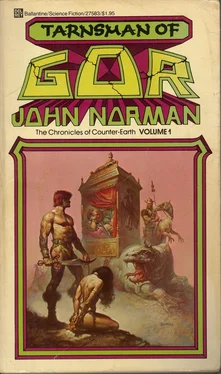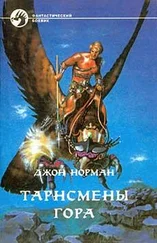In what seemed like an hour, but must have been no more than three or four minutes, I was behind the camp of Pa-Kur and searching for the dreaded Dar-Kosis Pits, those prisons in which the Afflicted may freely incarcerate themselves and be fed, but from which they are not allowed to depart. There were several, easily visible from above because of their broad, circular form, much like a great well sunk in the earth. When I came to one, I would bring the tare lower. When I had completed my search, I had found only one pit deserted. The others were dotted with what appeared, from the height, to be yellow lice — the figures of the Afflicted. Boldly, giving no thought to the possible danger of lingering infection, I dropped the tarn into the deserted pit.
The giant landed on the rock floor of the circular pit, and I looked upward, my glance climbing the sheer, artificially smoothed sides of the pit, which stretched perhaps a thousand feet above me on all sides. In spite of the breadth of the pit, perhaps two hundred feet, it was cold at the bottom, and as I looked up, I was startled to note that, in the blue sky, I could see the dim pinpricks of light which, after dark, would become the blazing stars above Gor. In the center of the pit a crude cistern had been carved from the living rock and was half filled with cold but foul water. As nearly as I could determine, there was no way in and out of the pit except on tarn back. I did know that sometimes the pathetic inmates of Dar-Kosis Pits, repenting their decision to be incarcerated, had managed to cut footholds in the walls and escape, but the labor involved — a matter of years — the death penalty for being discovered, and the very risk of the climb made such attempts rare. If there was some secret way in and out of this particular pit, assuming it was the one prepared by Marlenus, I did not see what it was and had no time to conduct a thorough investigation.
Looking about, I saw several of the caves dug into the walls of the pit, which, at least in most pits, house the inmates. In desperate, frustrated haste, I examined several of them; some were shallow, little more than scooped out depressions in the wall, but others were more extensive, containing two or three chambers connected by passageways. Some contained worn sleeping mats of cold, moldy straw, some contained a few rusted metal utensils, such as kettles and pails, but most were completely empty, revealing no signs of life or use at all.
After I emerged from one of these caves, I was surprised to see my tarn across the pit, his head tilted to one side, as if puzzled. He then reached his beak out to an apparently blank wall and withdrew it, repeating this three or four times, and then began to walk back and forth, snapping his wings impatiently.
I raced across the pit. I began to examine the wall with fierce closeness. I scrutinized every inch and ran my hands carefully over every portion of its smooth surface. Nothing was revealed to my eyes or to my touch, but there was the almost imperceptible odor of tarn spoor.
For several minutes I examined the blank wall, sure that it held the secret of Marlenus's entrance into the city. Then, in frustration, I backed slowly away, hoping to see some lever or perhaps some suspicious crevice higher in the escarpment, something that might play its role in opening the passage I was sure lay hidden somewhere behind that seemingly solid mass of stone. Yet no lever, handle, or device of any kind revealed itself.
I widened my search, wandering about the walls, but they seemed sheer, impenetrable. There seemed to be no place in which a lever or handle might be concealed. Then, with a shout of anger at my stupidity, I ran to the shallow cistern in the center of the pit and fell on my stomach before the chill, foul water. I thrust my hand into the slimy water, desperately examining the bottom.
My hand clutched a valve, and I turned it fiercely as far as it would go. At the same time from the escarpment came a smooth, rolling sound as a great weight was effortlessly balanced and lifted by hydraulic means. To my amazement, I saw that an immense opening had appeared in the wall. An enormous slab, perhaps fifty, feet square, had slid upward and backward, revealing a great, dim, squarish tunnel beyond, a tunnel large enough for a flying tarn. I seized the tam reins and drew the beast into the opening. Inside the door I saw another valve, corresponding to the one hidden under the water of the cistern. Turning it, I closed the great gate behind me, thinking it wise to protect the secret of the tunnel as long as possible.
Inside, the tunnel, though dim, was not altogether dark, being lit by domelike, wire-protected energy bulbs, spaced in pairs every hundred yards or so. These bulbs, invented more than a century ago by the Caste of Builders, produce a clear, soft light for years without replacement. I mounted the tarn, who was visibly uneasy in this strange environment. Without much success, by hand and voice, I tried to soothe the beast's apprehensions. Perhaps I spoke as much for my. own benefit as his. The first time I hauled on the one-strap, the bird would not move; the second time he lifted into flight, almost immediately scraping the ceiling of the tunnel with his wings, protesting shrilly. My helmet protected me as my head was roughly dragged against the granite of the ceiling. Then, to my pleasure, instead of alighting, the tam dropped a few feet down from the ceiling and began to streak through the tunnel, the energy bulbs flashing past me to form in my wake a gleaming chain of light.
The end of the tunnel widened into a vast chamber, lit by hundreds of energy bulbs. In this chamber, though empty of human beings, was a monstrous tam cot, in which some twenty gigantic, half-starved taros huddled separately on the tarn perches. As soon as they saw us, they lifted their heads, as if out of their shoulders, and regarded us with fierce attention. The floor of the tam cot was littered with the bones of perhaps two dozen tarns. I reasoned that the taros must be those of the men of Marlenus, left in the tarn cot when he entered the city. He had been cut off. Left without care for weeks, the tares had had nothing to feed upon but one another. They were wild now, crazed by hunger into uncontrollable predators.
Perhaps I could use them.
Somehow I must liberate Marlenus. I knew that when I entered the palace my presence would be inexplicable to the guardsmen and that I would not long be able to pass myself off as a herald of Pa-Kur, certainly not when it became clear that it was my intention to depart with Marlenus. Therefore, impossible though it might seem, I must devise some plan to scatter or overcome his besiegers. As I pondered, the fragments of a plan took form in my mind. Surely I was now beneath the Central Cylinder, and the embattled Marlenus and his men were somewhere above me, sealed off by the guardsmen of Ar. At the top of a broad series of stairs I saw the door that must lead to the Central Cylinder and noted with satisfaction that its dimensions were large enough to permit the passage of a tarn. Fortunately, almost at the foot of the stairs lay one of the gates of the taro cot.
I took my taro-goad and dismounted. I climbed the stairs that led to the portal into the cylinder, turned the valve, and as soon as the portal began to move, raced down to the tarn cot and swung open that barred gate which lay nearest the foot of the stairs. I stood back, partly shielding myself with the gate. In less than a few seconds the first of the scraggy tarns had lit on the floor of the cot and poked his ugly head through the door. His eyes blazed as he saw me. To him, I was food, something to be killed and eaten. He stalked toward me, around the gate. I struck at him with the taro-goad, but the instrument seemed to have no effect. The darting beak lunged at me again and again; the great claws grasped. The taro-goad was tom from my hand.
Читать дальше












